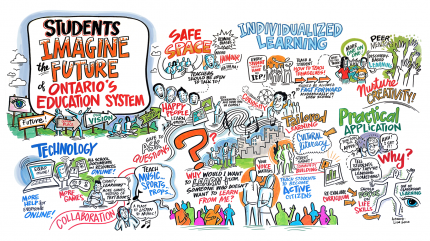New Education Strategy Focuses on Whole Child and Hopefully Lays Stronger Foundation for Food Literacy
Posted: April 10, 2014
Categories: Edible Education Network / GoodFoodBites
 On Monday April 7 the Ontario Ministry of Education released its new education strategy Achieving Excellence A Renewed Vision for Education in Ontario.
On Monday April 7 the Ontario Ministry of Education released its new education strategy Achieving Excellence A Renewed Vision for Education in Ontario.
The strategy begins with the statement “Ontario is committed to the success and well-being of every student and child. Learners in the province’s education system will develop the knowledge, skills and characteristics that will lead them to become personally successful, economically productive and actively engaged citizens.”
The document places a strong focus on “higher-order skills like critical thinking, communication, innovation, creativity, collaboration and entrepreneurship”.
It then notes 4 renewed goals for education:
• Achieving Excellence: Children and students of all ages will achieve high levels of academic performance, acquire valuable skills and demonstrate good citizenship. Educators will be supported in learning continuously and will be recognized as among the best in the world.
• Ensuring Equity: All children and students will be inspired to reach their full potential, with access to rich learning experiences that begin at birth and continue into adulthood.
• Promoting Well-Being: All children and students will develop enhanced mental and physical health, a positive sense of self and belonging, and the skills to make positive choices.
• Enhancing Public Confidence: Ontarians will continue to have confidence in a publicly funded education system that helps develop new generations of confident, capable and caring citizens.
As one reads further, what is notable about this strategy is that it puts a very clear emphasis on the need for schools to go beyond building academic skills, and places a strong emphasis on the need to support the whole child. The strategy notes the importance of opportunities both inside and outside of the classroom, the need for engaged students and educators, the benefits of focusing on play-based and experiential learning, the value in providing applied and innovative learning experiences, and that “students who have strong relationships and a positive sense of self – and who can understand and manage their own health and emotions – are in a better position to reach their full potential in the future”. Much of this is also captured in a graphic image that was developed by the Minister’s Student Advisory Council (show in the report).
Sustain Ontario and the Ontario Edible Education Network submitted comments during the government’s consultation process, where we encouraged the government to take a whole-school approach to healthy eating and to ensure that food literacy opportunities are firmly established within all schools. We communicated that this would better enable our children and youth to make healthy food choices for the duration of their lives, and to be integrated into a healthy food system. See our Blog Post on the subject and our written submission into the consultation process. We are now optimistic that the newly released strategy will provide a better framework for increasing food literacy in our schools through teacher training, curriculum links, experiential education, and other means; and we will continue to communicate these opportunities as the government shifts towards implementing its new vision.
One response to “New Education Strategy Focuses on Whole Child and Hopefully Lays Stronger Foundation for Food Literacy”
Leave a Reply
You must be logged in to post a comment.

[…] on the Education Strategy released in 2014, which put a clear emphasis on the need for schools to go beyond building academic skills, this […]